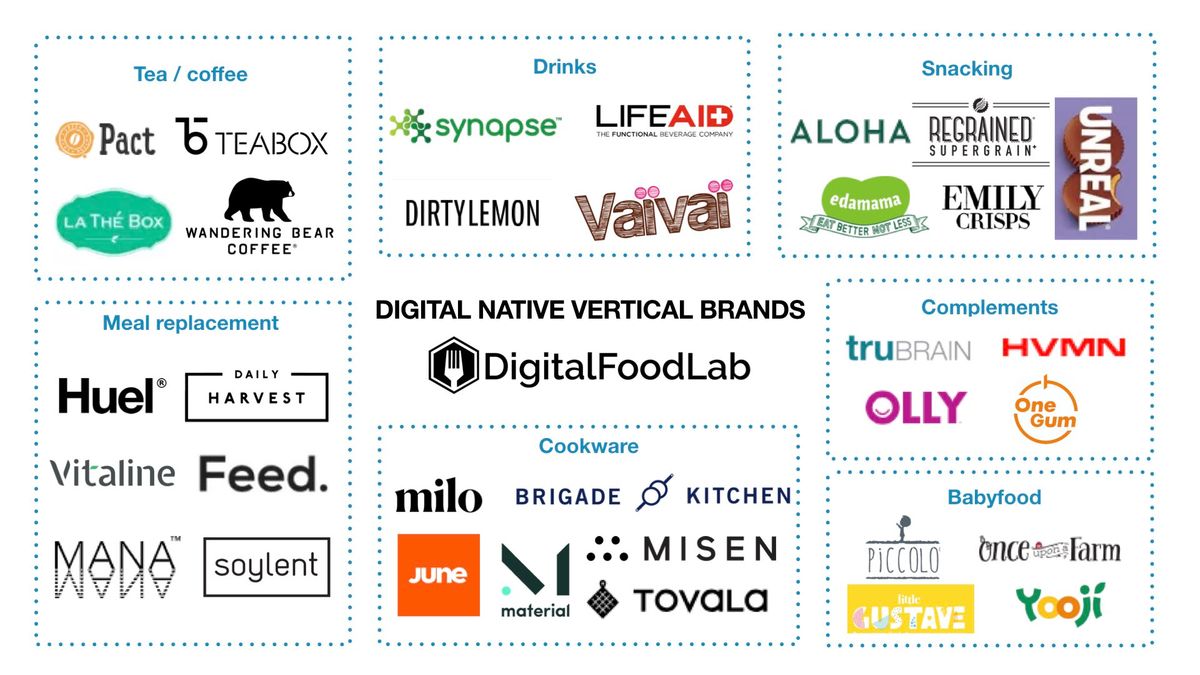
How vertical brands will change the food industry?
Hi,
DNVB is an acronym you may have already heard. It is becoming more and more common when talking about all these startups selling their products online. It stands for Digital Native Vertical Brands. It was initially coined by Andy Dunn, tosum up, what he has done and learned with Bonobos (which he co-founded in 2007 until selling it to Walmart in 2017). Even if DNVBs come from fashion, they are taking over many industries, among which Food. A DNVB:
- targets mostly digital natives and millennials through online and mobile e-commerce (therefore a DNVB is a direct-to-consumer brand). More than a traditional brand that can add (successfully) a new channel of sales online, a DNVB experience is primarily thought to be online.
- has a high level of interactions with their customers. It’s about being present on social media (with a focus on Instagram) but it’s even more about building an engaged community. It also means being transparent and interactive on the process of production, pricing…
- is vertically integrated from upstream to downstream and has high margins (which differs from other e-commerce ventures with very low margins)
- goes from digital to brick and mortar stores when successful with innovative and consumer-centric experiences.
In the last years, food DNVBs have grown really fast in a few domains such assnacks, tea, coffee, meal replacements… Furthermore, DNVBs are still a huge opportunity in many areas (such as Europe) where such brands are not well developed. Bellow is mapping showcasing some of the best examples of FoodTech DNVBs. If these new brands are scarcely represented in the fresh aisles of the supermarkets, they are becoming strong everywhere else.

Some of the most interesting examples are:
- RxBar: the healthy snacks brand, created in 2014, went from nowhere to more than $100m in sales in 2017 and a $600m exit to Kellogg that same year.
- Unreal: created by a 13-years old, this startup delivers to your door candy made “right” (which means healthier than traditional candy).
- Misen: nothing is out of the reach of DNVBs as proven by this startup focused on Japanese knives
- Dirty Lemon: going one step further, this functional drinks startup products can be ordered through texts
If one thing should be remembered about these DNVB brands it is speed. This comes from:
- high agility: without the cost of real estate, low inventory, a direct (and often affectionate) relationship with their customers and vertical integration, these brands can build quickly a product-market fit based on high quality and affordable prices
- loving customers: by targeting an initial community considered too niche by the big players, DNVBs can lower the cost of their marketing can grow quickly online
So, now it’s your turn. To understand how disruptive a concept is, you have to live it. Try to experience a week, month or a year in the DNVB world by only buying DNVB products for your clothes, snacks, cookware…
Have a great week!
Matthieu
Big Deal

Myco Technology raised $30 million from major food coporates (among which Tyson and Kellogg’s venture arms). The Colorado startup develops mushroom-based products enabling an increase of proteins or a reduction in added sugars.
Top News
Chowbotics enter the European market partnering with Bonduelle. Like in the US, Chowbotics and Bonduelle will deliver their customers (corporates canteen and offices) with automated salad kiosks (made with Bonduelle’s ingredients).
Munchery shuts down after raising $125m. Munchery, founded in 2010, announced in late January that it will shut down its operations. It was the leader in the full-stack delivery market (where a startup operates its own kitchens and delivers its meals to the customers). The startup had expanded into many cities in the US before shutting them down to refocus on the Bay Area. While it tried many business models, Munchery was not able to reach profitability even if it tried various business models.







